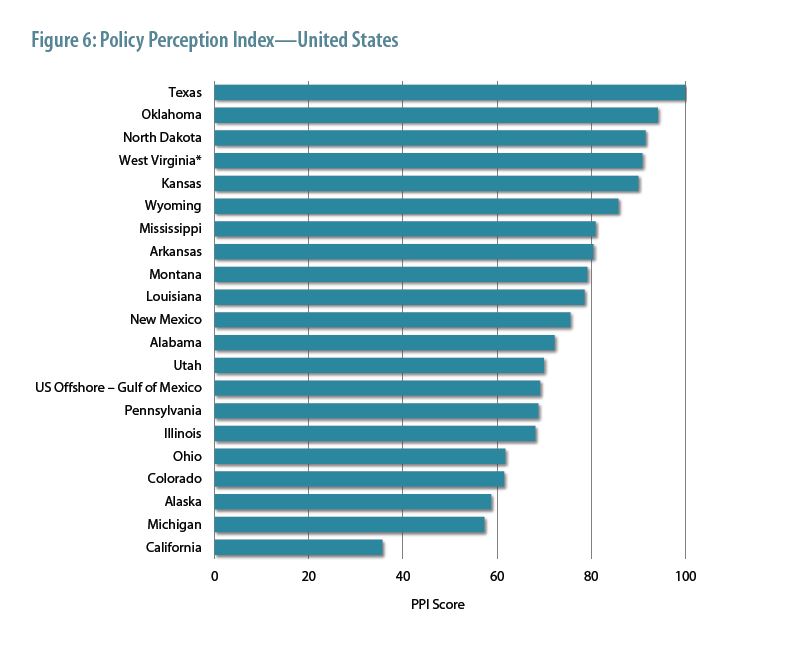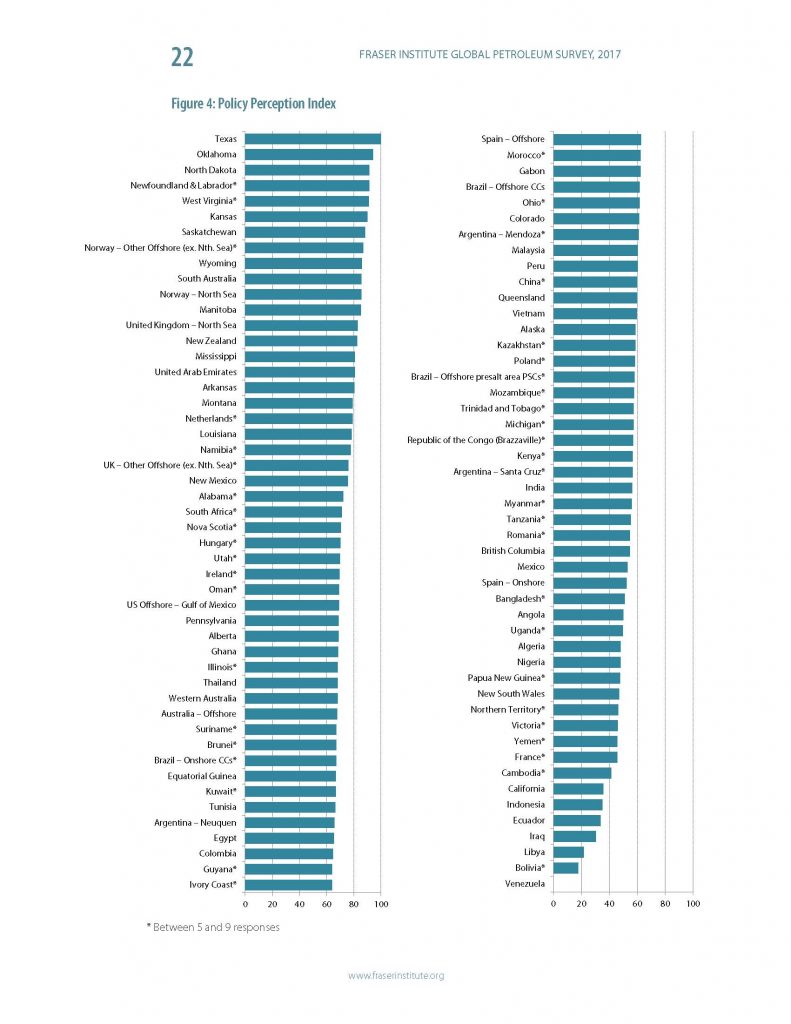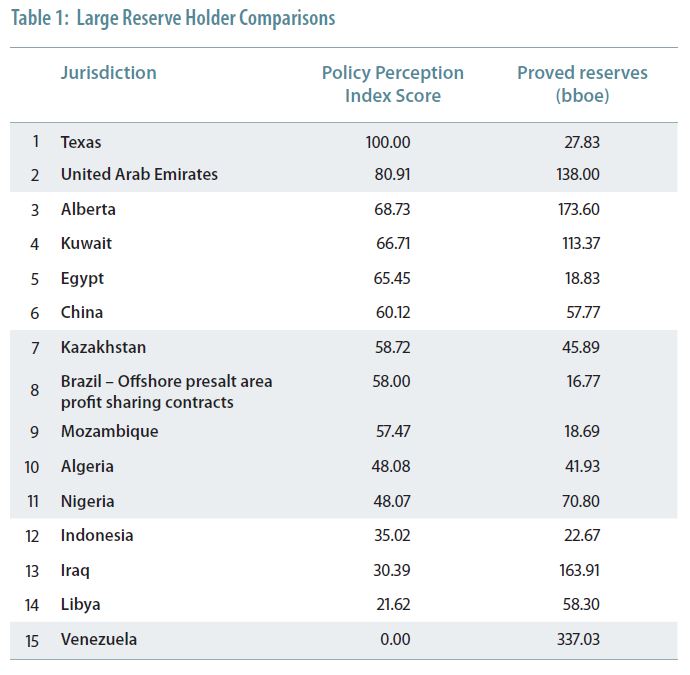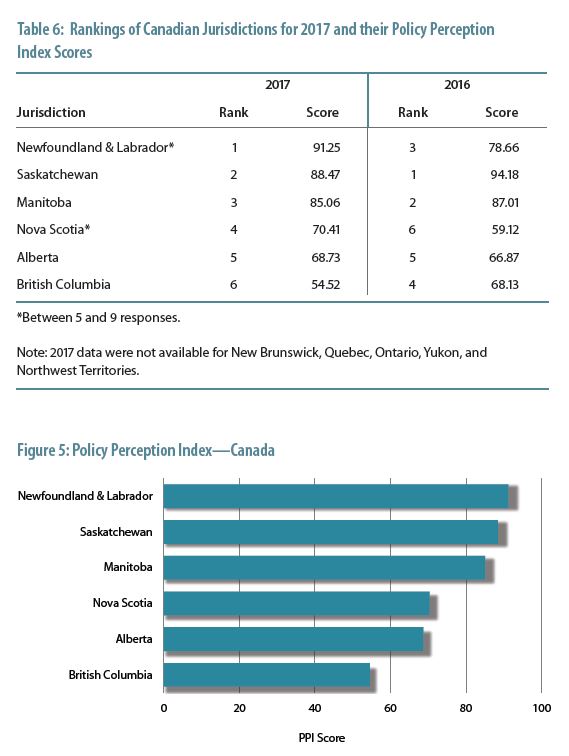The shackles are being taken off the U.S. energy sector, which spells trouble for Canadian jurisdictions trying to attract oil and gas investment dollars – Fraser Institute
What is the Global Petroleum Survey?
The annual survey, published by the Fraser Institute, studies barriers to investment in oil and gas exploration and production facilities in various jurisdictions around the globe. The survey responses have been tallied to rank provinces, states, other geographical regions (e.g. offshore areas), and countries according to the extent of such barriers.
Barriers, as assessed by the survey respondents (executives and other authorities in the petroleum industry), include high tax rates, costly regulatory obligations, and uncertainty over environmental regulations.
The Fraser Institute explained, “The jurisdictions that are evaluated are assigned scores on each of 16 questions pertaining to factors known to affect investment decisions. These scores are then used to generate a “Policy Perception Index” for each jurisdiction that reflects the perceived extent of the barriers to investment.”
More details about the survey can be found at the Fraser Institute’s website.
How the United States compares to the rest of the world
The Fraser Institute said that Texas was the most attractive jurisdiction in the world for oil and gas investment, taking back the top spot from Oklahoma, which held the designation last year.

“Texas and Oklahoma have, for years, been seen as the most attractive jurisdictions in the world for oil and gas investors—proof that sound regulatory policies and stable environmental protections help attract scarce investment dollars even when commodity prices are down,” said Kenneth Green, the Fraser Institute’s senior director of natural resource studies and co-author of the 2017 Global Petroleum Survey.
This year, U.S. states comprise six of the top 10 jurisdictions around the world: Texas (1st), Oklahoma (2nd), North Dakota (3rd), West Virginia (5th), Kansas (6th), and Wyoming (9th).
The Fraser Institute said, “The U.S. administration is pursuing major tax reforms and reducing regulatory red tape for the energy industry. American jurisdictions could be viewed even more favorably in coming years.”

The 10 least attractive jurisdictions for oil and gas investment are Yemen, France, Cambodia, California, Indonesia, Ecuador, Iraq, Libya, Bolivia and, lastly, Venezuela.
Among the 15 jurisdictions with the largest petroleum reserves worldwide, Texas is number one, followed by United Arab Emirates, Alberta (Canada), Kuwait and Egypt.

“With oil and gas investors losing confidence around the world, it’s crucial for policymakers to pursue sound regulatory and tax regimes—and perhaps most importantly stable environmental protections—that attract, not deter, petroleum investments,” Green said.
Canada
According to the Fraser Institute, British Columbia now ranks as the least-attractive Canadian jurisdiction for oil and gas investment. Since B.C.’s provincial election in May, the province has fallen to the bottom-end in rank. This year, B.C. ranks 76th out of 97 jurisdictions. Last year, B.C. was ranked 39th out of 96 jurisdictions. The survey was conducted after the B.C. election and oil and gas executives gave the province low marks for political stability and high regulatory compliance costs.
“Investor confidence matters, and having a government that’s openly hostile to resource development has apparently sent a chill throughout the oil and gas industry,” said Green. “The competitive headwinds Canadian jurisdictions already face in the energy sector will likely get stiffer as regulatory and tax burdens continue to lighten in the U.S.”

Alberta ranked 33rd overall this year, making it the second-lowest Canadian jurisdiction after B.C. In 2014, Alberta was ranked 14th globally out of 156 jurisdictions. More than 50 percent of survey respondents said that Alberta’s high taxes deterred investment.
However, Newfoundland/Labrador was the top ranked province, having moved up from 25th last year to the fourth most attractive worldwide this year. Saskatchewan ranked 7th this year, three positions down from last year.






